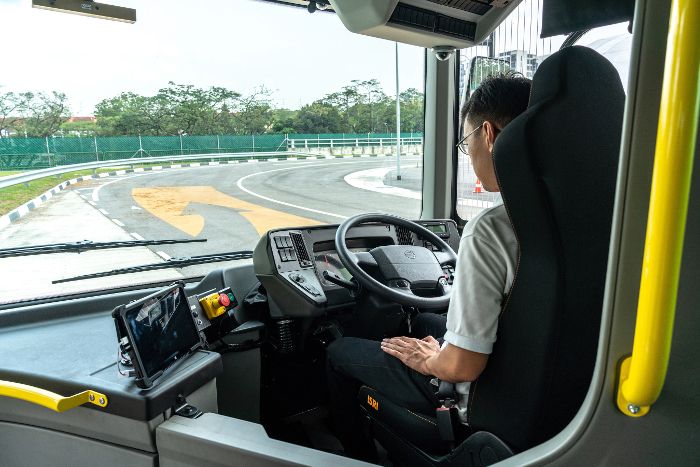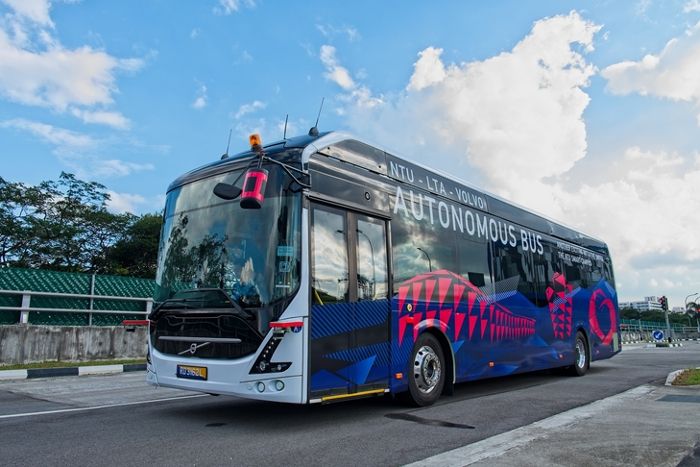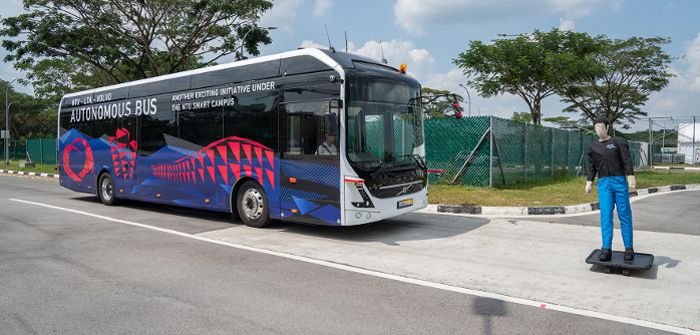The Nanyang Technological University (NTU) in Singapore and Volvo Buses have unveiled the world’s first full-size, autonomous electric bus, which will soon begin trials at the NTU Smart Campus before being extended to public roads in the city-state.
This is a key milestone in NTU and Volvo’s development program under the university’s partnership with Singapore’s Land Transport Authority (LTA) to develop and conduct autonomous bus trials for fixed route and scheduled services, which was announced in October 2016.
The single-deck Volvo 7900 Electric bus is 40ft (12m) long with a capacity of around 80 passengers (36 seated), and is equipped with numerous sensors and navigation controls managed by a comprehensive NTU-developed artificial intelligence (AI) system.
 Ensuring maximum safety and reliability, the AI system is also protected with industry-leading cybersecurity measures to prevent unwanted intrusions. This will be Volvo’s first fully autonomous and electric bus used in public transportation anywhere in the world.
Ensuring maximum safety and reliability, the AI system is also protected with industry-leading cybersecurity measures to prevent unwanted intrusions. This will be Volvo’s first fully autonomous and electric bus used in public transportation anywhere in the world.
The Volvo bus is the first of two that has undergone preliminary rounds of rigorous testing at the Center of Excellence for Testing and Research of Autonomous vehicles at NTU (CETRAN). Jointly set up by NTU, LTA and JTC, the CETRAN facility replicates various elements of Singapore’s urban road condition, such as traffic signals, multiple bus stops and pedestrian crossings, and tropical conditions such as driving through heavy rain and partially flooded roads.
As part of the on-road trials, Singapore’s public transportation operator SMRT will play a key role in determining the roadworthiness of autonomous buses on public roads. While plans are in place to test the first bus on the NTU campus, a second autonomous Volvo bus will undergo tests at a bus depot managed by SMRT, which will provide a real-world environment to assess the vehicle’s ability to autonomously navigate into vehicle washing bays and park safely at charging areas.
The bus comes with Volvo’s Autonomous Research Platform software that is connected to key controls such as its navigation system, as well as multiple sensors, including lidar and stereo-vision cameras that capture images in 3D. The bus also has an advanced global navigation satellite system that uses real-time kinematics. This is similar to any global positioning system (GPS), but uses multiple data sources to give pin-point location accuracy of up to one centimeter.
 The system is also hooked up to an ‘inertial management unit’, which acts like a two-in-one gyroscope and accelerometer, measuring the lateral and angular rate of the bus to improve its navigation when going over uneven terrain and around sharp bends, ensuring a smoother ride for passengers.
The system is also hooked up to an ‘inertial management unit’, which acts like a two-in-one gyroscope and accelerometer, measuring the lateral and angular rate of the bus to improve its navigation when going over uneven terrain and around sharp bends, ensuring a smoother ride for passengers.
“This fully autonomous electric bus will play a role in shaping the future of public transportation that is safe, efficient, reliable and comfortable for all commuters,” explained NTU’s president, Professor Subra Suresh.
“This research project not only involves cutting-edge science, technology and AI, but is also an excellent example of close partnership among academia, industry and government agencies in translating basic research into products and services for the benefit of Singapore and beyond.”
Click here to watch a video of the bus in action.





